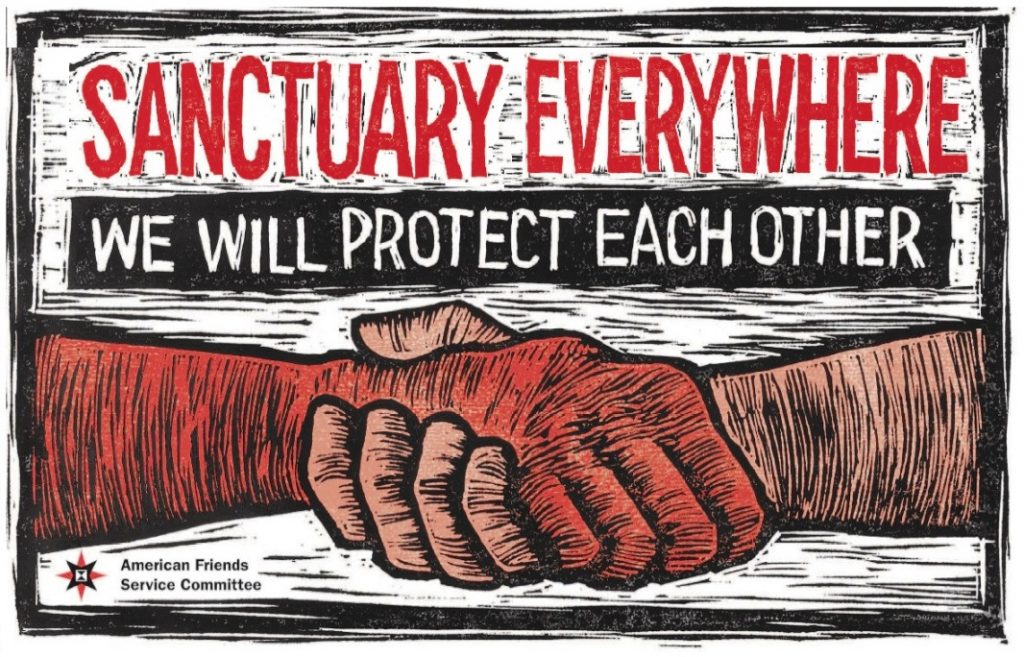By Lisa Matthews, Coordinator at Right to Remain

“I hope it’s a new way of being a church — a new way of having an impact on society, a new way of standing up for vulnerable people”
These are the words of Derk Stegeman, one of the organisers of a “non-stop church service” in the Hague, which ended after 96 days this week.
The service – which started in October last year – was organised because Dutch law prevents the police from interrupting church services, meaning the service could become a haven for the Tamrazyan family, originally from Armenia, who had sought asylum in the Netherlands.
As Patrick Kingsley writes in the New York Times, pastors from across Europe came to take part in the service, and more than 250,000 people signed a petition calling for a “Children’s Pardon”.
The church decided that the service could be safely ended this week following an agreement between the ruling parties of the Netherlands’ governing coalition. The provisional agreement means that around 700 families who are facing deportation despite having lived in the Netherlands for many years – could have their cases reassessed.
Sanctuary in action
In a statement issued in the early days of the continuous church service, the organisers said:
“The Protestant Church of The Hague respects court orders, but finds
itself confronted with a dilemma: the choice between respecting the
government and protecting the rights of a child”.
Communities of worship and places of worship have a notable history of providing sanctuary. The word “sanctuary” itself is of course a synonym for asylum, and describes an area of the church where people used to be able to go to be immune from arrest.
In late 2013, Afghan asylum seekers sought sanctuary in a seventeenth-century baroque church in Brussels, and protested against the prospect of being forcibly returned to danger. They spoke of the support they had been given by the Belgian Catholic Church and the priest of Saint Antonius church, Marcel De Meyer, said:
“I think the church has the right and even the obligation to disrespect certain laws… it is simply unacceptable that they get extradited and sent back to such a country. It’s even immoral in my opinion”
Last year, more than 1,100 mosques, synagogues and churches had signed up to be part of the Sanctuary Movement in the United States, offering protection to undocumented migrants.
This latest iteration echoes the move in the 1980s by hundreds of congregations, to offer shelter to Central American refugees. You can listen to a great podcast on this subject here.
The sanctuary movement draws on a long past of protection, including providing refuge for religious minorities in the eighteenth century, assisting slaves in the south of the United States in the nineteenth century, and more recently Jews and other flee the Nazi regime in the 1930s. Quakers in Britain explicitly reference this past in their Sanctuary Everywhere manifesto.
The pledge of the Mosque Sanctuary Movement in the States says:
“As Muslims, we are called on by our prophetic tradition to join and protect our congregants, neighbors, and community members facing deportation and other unjust policies.”
Immigration and Customs Enforcement (ICE) in the United States regards places of worship as “sensitive locations” (a category that also includes schools and hospitals” and says that while they can initiate immigration enforcement actions in such places, this is in “limited circumstances” and “will generally be avoided”.
The Home Office in the UK doesn’t seem to share this idea of “sensitive locations”, having been known to embed staff in places of worship, and, in this example, breaking down the door of a mosque with a battering ram.
It makes the flowers in my heart grow
In a time of rising xenophobia, racism and anti-migrant politics, the ties that bind to us to our fellow humans are more important than ever.
Sanctuary in action means ordinary people speaking up, speaking out, and doing something meaningful to protect individuals and show that these politics, these policies, these hate-mongers don’t represent us.
That can involve defending members of our community, and trying to change government policy (such as these faith leaders speaking out against immigration detention).
We may need MPs and civil servants to change law and policy – but change comes from us.
Hayarpi, one of the Tamrazyan family, has described her experiences of the non-stop church service through poems posted to a blog. One of these reads:
“Around-the-clock 7 days a week
We praise and worship God
It makes the flowers in my heart grow
It makes me thankful
In a way I’ve never been before.”
















Discussion: